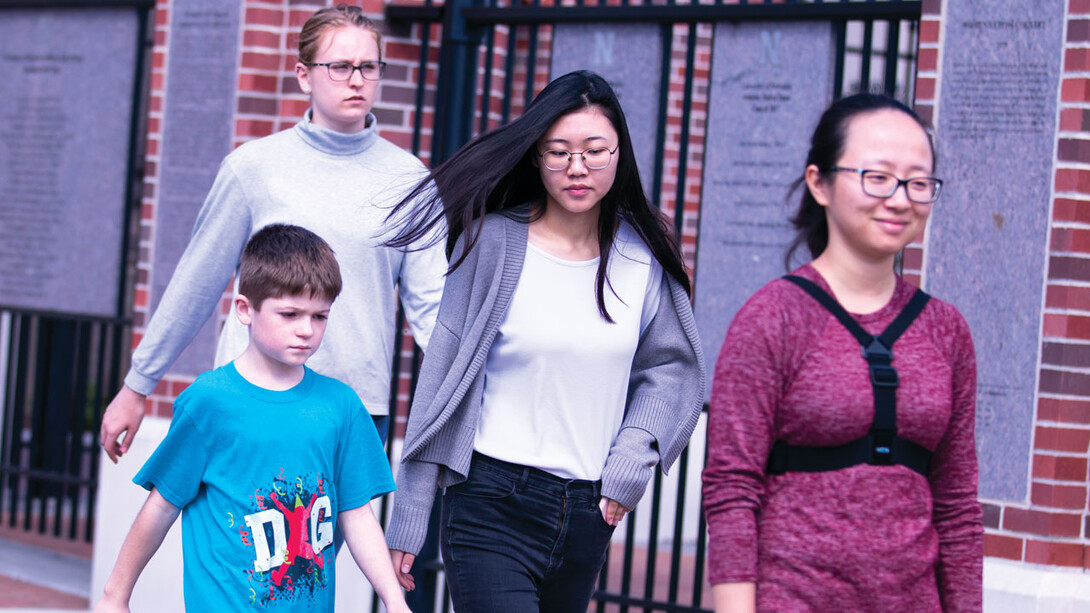
Birds sing and a cool breeze rustles through the leaves as a pair of squirrels scurry through the tall, green grass and up a tree — all under blue skies and sunshine.
Such scenes are typical during a leisurely, summer walk through a park — relaxing and uplifting for most people. For a team of University of Nebraska–Lincoln researchers, however, those elements may prove to be even more significant.
Julia Torquati, professor of child, youth and family studies, is the principal investigator of a research project designed to explore the restorative potential of natural environments for children diagnosed with autism spectrum disorder. She and co-principal investigator Anne Schutte, associate professor of psychology, are exploring whether natural environments can pave the way to individualized plans to help children with autism better focus and self-regulate in school.
Torquati, who also serves as interim chair of Nebraska’s Department of Child, Youth and Family Studies, notes substantial evidence that suggest natural environments are mentally restorative. While human-made, urban landscapes pepper us with stimulation, nature helps us relax and rejuvenate.
“The natural environment is dynamic; there’s always something happening no matter what,” said Torquati, a faculty affiliate of the Nebraska Center for Research on Children, Youth, Families and Schools. “Research has shown the benefits of nature where cognitive functioning is concerned.”
At the center of the research is Attention Restoration Theory, or ART, which is based on two attentional systems: directed attention and involuntary attention.
Directed attention enables us to focus on demanding tasks such as driving, reading and writing, but can become fatiguing. With involuntary attention, however, less mental effort is required. This is where natural environments fit into the equation. Urban distractions are replaced by forests, streams, rivers, lakes and oceans — interesting, engaging scenes that require little mental effort.
Where directed attention is cognitively fatiguing, involuntary attention aids rest and recovery.
Torquati’s research is part of a larger study led by Georgia State University, funded by a grant from the U.S. Forest Service. Torquati was asked by Georgia State researchers to conduct a study with autism spectrum disorder-diagnosed children.
Besides Lincoln, the project’s other research locations are Athens, Georgia; Atlanta; Denver; and Flagstaff, Arizona. Lincoln is the only location that does not use a summer camp setting.
For Torquati’s research, 30 children diagnosed with autism will twice visit the Center for Brain, Biology and Behavior Lab to complete subtests from the Wechsler Intelligence Scale for Children, which simulate assignments in a school environment. On each visit, after they finish the test, the children take a 20-minute campus walk.
One walk features a route through green space while the other walk is more urban, featuring roads and railroad tracks.
Researchers document the walks using GoPro mini-cameras and test the hypothesis that during the nature walk, children will exhibit fewer behaviors associated with autism, such as repetitive movements. An array of variables are documented, such as the air temperature, weather conditions and whether a parent is present. Saliva is collected to analyze each child’s cortisol hormone levels.
After the walk, the child returns to the lab to take an assessment of attention and inhibitory control and spatial working memory.
“We’re really testing whether the walk is restorative,” Torquati said.
Once data are gathered and analyzed, researchers will compare children’s attention, impulse control, spatial working memory, verbal working memory and cortisol response. The first four are indicators of cognitive restoration, while the last measures stress reduction.
The walks began last May. Since the beginning of the fall semester, campus walks have been limited only to Saturdays without a Nebraska home football game and Sundays. Data collection will continue into next summer.
Until Torquati’s research, no study of Attention Restoration Theory had specifically targeted children with autism spectrum disorder. While other research has focused on attention deficits, she said, this project aims to provide information for developing and incorporating nature interventions into individually tailored plans for school accommodations.
Along with Torquati and Schutte, the team also includes graduate research assistants Keting Chen and Hyerim Shin; and undergraduate research assistants Samantha Moore and Yiling Zhang.







